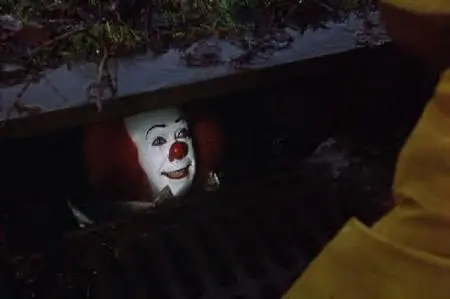When the made-for-TV version of Stephen King's It came out in 1990, I was almost eleven. Filled to the brim with horror movie bravado, there was no way I was missing a movie about kids battling a killer clown.
I loved It, and watched It on video until the VHS tape wore out. Something about the way the children faced and overcame the creepiest bad guy in history inspired me. Something about Tim Curry's performance as Pennywise the Dancing Clown made my knees weak. The quotes etched themselves into my brain. They all float down here, and when you're down here, you'll float too!
A tattered copy of It—the paperback—sat on my parents’ bookshelf. For almost three years It's spine would catch my eye, taunting me, challenging me to read It. I wanted to read It. I wanted to be brave enough to answer It's siren call. For the next two years, I’d sneak to the shelf, pick It up, panic, and then slide It back into the gaping wound left by It's absence.
Then, suddenly, I was 13. Seventh grade loomed, terrifying, over me. I picked up the book, sure It couldn’t be as scary as another year in middle school, and this time I started to read. It was September—always an ominous month in New Jersey, with slate-gray skies and chilly breezes. Exactly like Derry, Maine, It's home and hiding place.
Having seen the movie, it was easy to visualize the scenes in the book, and I found myself near tears with concern over Seth Green as Richie Tozier, and Jonathan Brandeis as Bill Denbrough. This was a book in which kids—kids like me—died, and died horribly. Often, too. They were my age. My peers. I couldn’t imagine anything more horrible. Not even the seventh grade.
I read It at arms' length, holding the book as far from my face as possible, so Pennywise the Dancing Clown couldn't reach through the pages of the novel like he reached through the pages of George Denbrough's photo album.
I read It bit by bit. A chapter here, a chapter there. Sometimes I put the book away, hiding It deep in the recesses of the cavernous space beneath my bed. Weeks would pass until I gained the courage to go searching for It, and then the cycle would begin again.
Read, hide. Read, hide. I've never had a book affect me so, before or since. It took me nine months to read It - the full school year - and from then on, I held It up in my mind as the standard for a great horror novel. My white whale of terror, so to speak.
****
A few years ago my dogs stood in the back of my yard, barking at a gap between the ground and the fence. There’s a storm drain there, situated to collect rainwater runoff. I walked over to see what the fuss was about, and climbed up to take a peek.
A bright yellow balloon sat atop the storm drain, dancing hypnotically in the gentle breeze.
I ran far and I ran fast. My hands shook for the next two hours.
****
Nowadays, I write horror stories myself. I've read dozens of books in the genre since the seventh grade, but nothing has ever come close to It.
When a recent scene in a book I've been writing started to plague me—I couldn't get it quite as scary or suspenseful as I wanted—I decided to return to It, to Stephen King, to take a master class from the Master himself. I needed to figure out why It scared me so much, to untangle the fears that haunted me for 21 long years. I needed to see what made It tick.
Almost as soon as I began reading, I forgot why I was doing it. I got wrapped up in the story just like the first time. This time, though, I was shocked by how different It felt.

The kids who once felt like my friends, my contemporaries, suddenly felt like...kids. Babies. Eleven-year-olds. That they were forced to fight evil suddenly felt unfair, and “unfair” seemed like the understatement of the century. It brought out something real in me, something visceral, because this time, I wasn’t afraid for myself. This time I was afraid that fucker Pennywise was going to hop out the book and disembowel my five-year-old daughter.
This time I identified with the parents who lost their kids. I imagined losing my child, and I cried. I couldn’t handle the thought, and spent evenings sneaking into her room in the dark, watching her sleep and breathe.
****
But how's my story, right? Isn’t that what I was supposed to figure out?
The truth is I didn't. King has always had, and always will have, that certain something writers spend lifetimes trying to achieve. He uses literary-quality writing to tell genre stories, instilling sights, smells, and sounds so vivid it's easy to lose yourself inside it.
Maybe that is what makes It tick. The quality of his writing is something I can envy, not copy. At least not yet. His prose flows like poetry, at times as good as Hemingway or Updike or Morrison.
He changes voices as easily as most of us change socks, slipping seamlessly from one point-of-view character to the next. Reading a chapter from the perspective of Eddie Kasbrack—the sweetest and gentlest of the children—is soothing even when a leper emerges from beneath a haunted house to devour him. His voice is soothing. But to read a chapter told by Tom Rogan, the abusive husband of Beverly Marsh, is to read and feel rage. King’s word choices change, his cadence becomes more staccato. I don't know another writer who transitions quite so smoothly.
There are some issues with It, though. Issues I missed when I was only 13. For one, among the group of friends is just a single girl, Beverly. For the most part, she's a total bad-ass. But in almost any given situation, Bev is the first to cry, the first to break. I love her, but I wish King had given her the benefit of the doubt a little more. I think she was tougher than her face full of tears implied.
It’s also long—too long, I think, taking me close to a full month to read even now—and the bits at the end about the Turtle and It and the Other Thing were weird and almost hokey. He lost me at the ritual of Chud, as well as with the densely written pages devoted to the destruction of Derry upon It's death. I skimmed quite a bit at the end, ready to move on.
But the story? Overall? It’s still really, really good.
The thing is—and this is a very big thing—I actually enjoyed reading It this time around, which was a bit of a shocker. I read It into the darkest hours of the night, forgoing sleep to read just a few more pages.
I carried It everywhere with me. If I was upstairs, so was It. If I sat on the porch, so did It. It was a complete turnaround from when I was 13, and the book's presence in a room haunted me. Back then, I couldn't enjoy King's rich, sensory writing. I couldn't enjoy the humor infused in so many pages. I couldn't enjoy his portrayal of the children and their Loser's Club. All I could do was pray I'd never be part of the Loser's Club myself.
And as a writer, I was surprised to discover the genesis for much of my own writerly voice. It was subconscious, I'm sure, but it exists. There's a specific way King takes his characters from tears to laughter, from laughter to overwhelming fear, with which I love playing in my own stories. I didn't remember it was there, in It, but now I feel like a thief.
****
The fact is, in It, King definitely gives us a master class in horror, in weaving together plots more intricate than a patchwork quilt sewn by an old Derry housewife. His talent’s at its best in those moments when the different voices, different ages, different characters, come together to form one brilliant, cohesive story.
That said, It didn’t make me want to puke from fear this time around. Why? I've tried to figure that out, too.
Maybe it’s because I write scary stories now. Maybe it’s because I’ve learned how scary the real world actually is. Or maybe it’s just that I'm a grown-up, and, just like in It, grown-ups see things differently.
But that’s okay. If being a grown-up means I get to enjoy books that beat me up as a kid, I'm fine with that. I don’t miss the nightmares about killer clowns down in the sewers.
But then…on a recent rainy day my daughter and I went for a walk in between downpours. She saw a storm drain carved into the side of the road, water flowing into down. "Mommy, what's down there?" she called as she ran to it, excited to learn something new.
I shuddered. "Back away," I said. "If there's one thing we don't do, it's look into storm drains."
So maybe Pennywise hasn't relinquished his grip on me...at least not yet.

About the author
Leah Rhyne is a Jersey girl who's lived in the South so long she's lost her accent...but never her attitude. After spending most of her childhood watching movies like Star Wars, Aliens, and A Nightmare On Elm Street, and reading books like Stephen King's The Shining or It, Leah now writes horror and science-fiction. She lives with her husband, daughter, and a small menagerie of pets.








